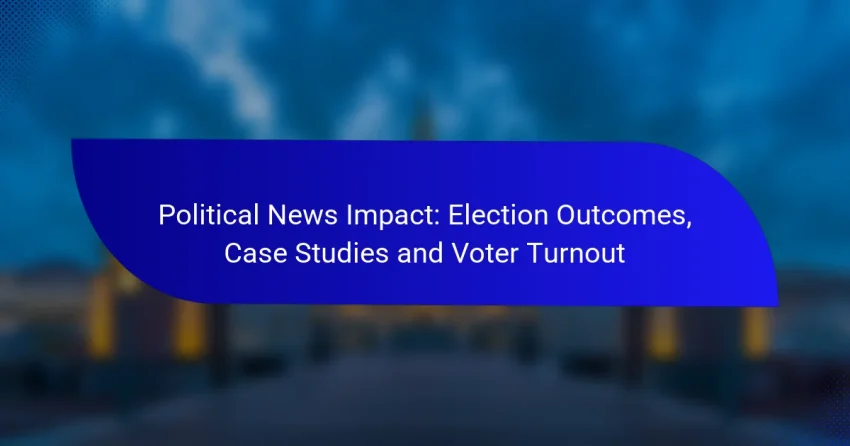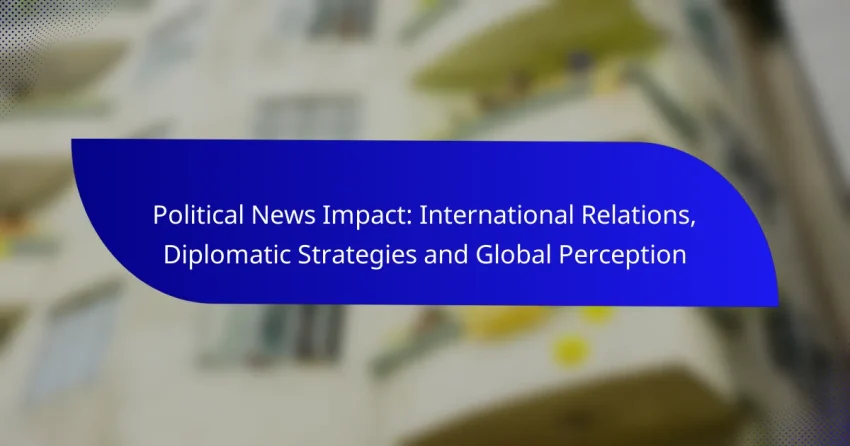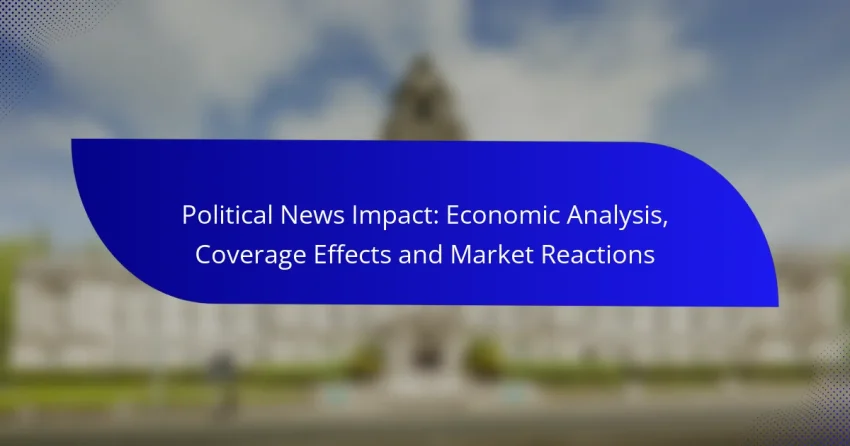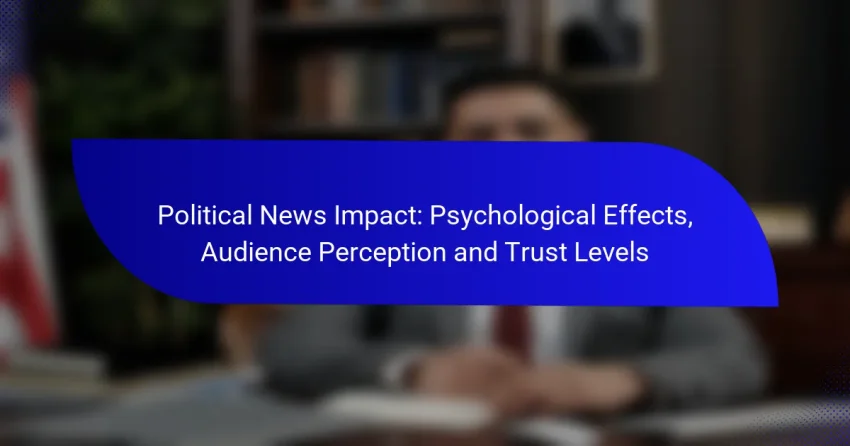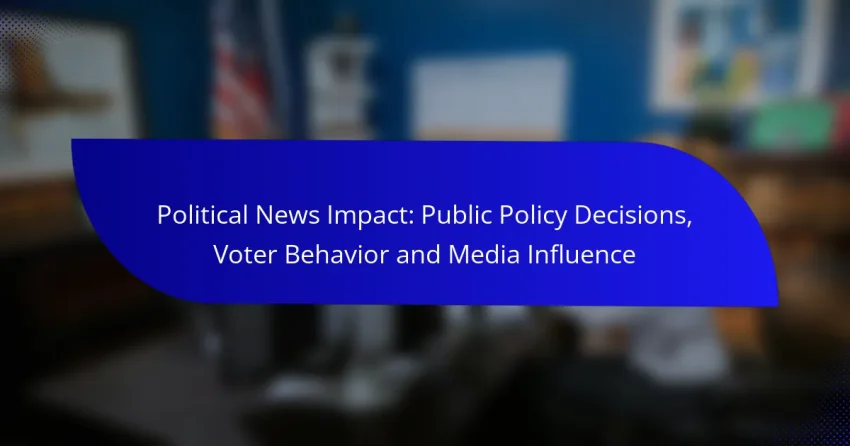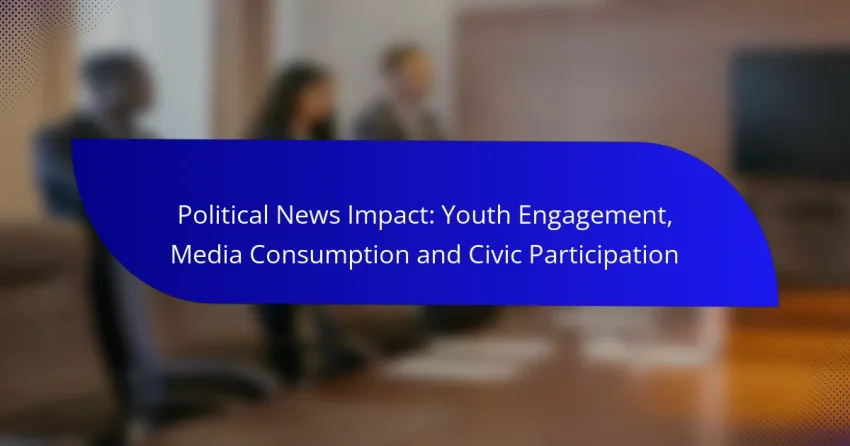Political news plays a crucial role in shaping election outcomes by influencing public opinion and voter engagement. Through case studies, we can explore how different news narratives impact voter behavior and turnout, revealing patterns that affect the electoral landscape. Robust news coverage can motivate citizens to participate, while insufficient coverage may lead to disengagement and…
Category: Political News Impact
Political news plays a crucial role in shaping public opinion and influencing how individuals perceive various political events and issues. Its impact extends beyond individual attitudes, affecting economic behavior and market dynamics as well. The way news is reported and consumed can lead to significant fluctuations in public confidence and engagement in the political process.
Political News Impact: International Relations, Diplomatic Strategies and Global Perception
Political news plays a crucial role in shaping international relations by influencing how countries perceive one another and altering their diplomatic strategies. As political landscapes evolve, nations may adjust their alliances and negotiation tactics, emphasizing the importance of staying informed. Additionally, the framing of political events can significantly impact global perceptions, affecting public sentiment and…
Political News Impact: Economic Analysis, Coverage Effects and Market Reactions
Political news plays a crucial role in shaping economic conditions by influencing market perceptions and consumer behavior. Events such as elections and policy changes can trigger immediate shifts in economic activity, while the coverage of these events affects public opinion and market reactions. As markets respond swiftly to political developments, fluctuations in stock prices and…
Political News Impact: Community Engagement, Social Movements and Public Discourse
Political news plays a crucial role in shaping community engagement by informing the public and inspiring civic participation. As individuals become more aware of political issues, they are motivated to engage in activities such as voting and activism. Additionally, social movements utilize political discourse to advocate for change and amplify marginalized voices, fostering important dialogues…
Political News Impact: Psychological Effects, Audience Perception and Trust Levels
The psychological effects of political news are profound, often leading to increased anxiety and mood fluctuations among individuals. Audience perceptions, influenced by source credibility and social media dynamics, play a critical role in shaping trust levels and the interpretation of political information. Understanding these factors is essential for navigating the complex landscape of political discourse…
Political News Impact: Public Policy Decisions, Voter Behavior and Media Influence
Political news plays a crucial role in shaping public policy decisions and influencing voter behavior. By framing issues and guiding public perception, the media can significantly impact legislative outcomes and electoral results. The narratives constructed by various media outlets not only inform but also sway how individuals understand and respond to political matters. How Does…
Political News Impact: Youth Engagement, Media Consumption and Civic Participation
Political news plays a crucial role in shaping youth engagement by enhancing their awareness of social issues and inspiring them to participate in civic activities. As young individuals consume various media, their understanding of the political landscape deepens, which can lead to increased involvement in democratic processes and community initiatives. How Does Political News Influence…
How Does Political News Impact Public Opinion?
Political news significantly shapes public opinion by influencing how individuals perceive political events and issues. It can sway attitudes, inform decisions, and affect overall engagement in the political process.
Influence on voter behavior
Political news plays a crucial role in shaping voter behavior by informing citizens about candidates, policies, and election issues. For instance, coverage of a candidate’s debate performance can lead to shifts in voter support, often swaying undecided voters.
Moreover, the timing of news reports can impact voter turnout. For example, last-minute revelations or endorsements can energize or demoralize voters, affecting their likelihood to participate in elections.
Shaping perceptions of issues
Media coverage can frame political issues in specific ways, influencing how the public perceives their importance. For example, extensive reporting on climate change can elevate it as a priority for voters, while minimal coverage may lead to apathy.
Additionally, the language used in political news can affect public sentiment. Terms like “crisis” or “reform” carry different connotations, which can shape how people view the urgency or necessity of an issue.
Role in political polarization
Political news can contribute to polarization by reinforcing existing beliefs and creating echo chambers. When individuals consume news that aligns with their views, it can deepen divisions and reduce willingness to engage with opposing perspectives.
Furthermore, sensationalist reporting can exacerbate tensions, leading to a more divided electorate. Understanding this dynamic is essential for consumers of news, as it highlights the importance of seeking diverse viewpoints to foster a more balanced perspective.
What Are the Economic Effects of Political News?
Political news can significantly impact the economy by influencing market behavior and consumer sentiment. The way news is reported and perceived can lead to fluctuations in stock prices and shifts in public confidence, which in turn affect spending and investment decisions.
Market volatility
Political news often triggers market volatility, as investors react to developments that may affect economic stability. For instance, announcements regarding policy changes or election outcomes can lead to rapid price changes in stocks, bonds, and commodities. This volatility can be particularly pronounced during election cycles or major legislative decisions.
Investors should be aware of the potential for sudden market shifts following significant political events. Monitoring news sources and understanding the implications of political developments can help in making informed investment decisions. For example, a controversial policy proposal might lead to a temporary dip in stock prices, presenting a potential buying opportunity.
Impact on consumer confidence
Political news can greatly influence consumer confidence, which is a key driver of economic activity. Positive news about government stability or economic policies can boost consumer spending, while negative news can lead to caution and reduced expenditures. For example, reports of political unrest may cause consumers to delay major purchases.
To gauge consumer sentiment, businesses should track political developments and public reactions. Engaging with customers through surveys or feedback can provide insights into how political news affects their purchasing behavior. Companies may need to adjust their marketing strategies based on the prevailing mood, especially during uncertain political climates.
How Do Different Media Outlets Affect Political News Coverage?
Different media outlets significantly shape political news coverage through their editorial choices, audience engagement, and reporting styles. These factors can influence public perception and understanding of political events and issues.
Bias in reporting
Bias in reporting refers to the tendency of media outlets to present news in a way that favors a particular political perspective. This can manifest through selective coverage, language choices, and the framing of issues. For instance, a conservative outlet may emphasize the economic benefits of a policy, while a liberal outlet might focus on its social implications.
To identify bias, consider the language used and the sources cited. Outlets that predominantly feature experts or commentators from one political side may not provide a balanced view. Readers should seek diverse sources to gain a more comprehensive understanding of political news.
Differences in audience reach
Audience reach varies widely among media outlets, impacting how political news is disseminated and perceived. Major networks like CNN or Fox News typically have millions of viewers, while smaller, niche outlets may cater to specific demographics or interests. This difference can affect the depth and breadth of coverage on political issues.
For example, a mainstream outlet may cover a breaking political story extensively, while a local or specialized outlet might focus on community impacts or niche perspectives. Understanding the audience reach of different outlets can help consumers of news gauge the potential influence and relevance of the information presented.
What Role Does Social Media Play in Political News Dissemination?
Social media serves as a primary channel for the rapid dissemination of political news, allowing information to spread quickly among users. Platforms like Twitter, Facebook, and Instagram enable real-time sharing and engagement, significantly influencing public perception and discourse.
Viral news trends
Viral news trends emerge when specific political stories capture widespread attention, often fueled by social media algorithms that prioritize engaging content. These trends can shape public opinion and drive conversations, sometimes leading to significant political movements or changes in policy. For instance, hashtags related to political events can trend globally, amplifying voices and issues that might otherwise remain underreported.
To effectively engage with viral trends, users should monitor trending topics and participate in discussions, but be cautious of misinformation that can spread alongside legitimate news. Fact-checking sources and cross-referencing information are essential to maintain credibility and ensure informed participation.
Influencer impact
Influencers play a crucial role in shaping political narratives on social media by leveraging their large followings to promote specific viewpoints or information. Their endorsements can significantly sway public opinion, especially among younger demographics who often trust influencers more than traditional media. For example, a well-known influencer discussing a political issue can lead to increased awareness and engagement among their followers.
When collaborating with influencers, political campaigns should choose individuals whose values align with their message to ensure authenticity. Additionally, campaigns must be transparent about partnerships to maintain trust with the audience. Engaging influencers effectively can enhance outreach and mobilize support for political initiatives.
How Can Consumers Navigate Political News Effectively?
Consumers can navigate political news effectively by employing critical thinking and utilizing reliable resources. This approach helps in discerning fact from misinformation and understanding the broader context of news stories.
Fact-checking resources
Fact-checking resources are essential tools for verifying the accuracy of political news. Websites like Snopes, FactCheck.org, and PolitiFact provide independent assessments of claims made in the media and by public figures. Regularly consulting these sites can help consumers avoid spreading false information.
When using fact-checking resources, look for clear citations and evidence supporting their conclusions. A good practice is to cross-reference multiple fact-checkers to ensure consistency in their findings.
Identifying credible sources
Identifying credible sources is crucial for consuming political news responsibly. Reliable news outlets typically have established editorial standards, transparency about their funding, and a history of accurate reporting. Examples include major newspapers, respected television networks, and academic publications.
To assess a source’s credibility, consider its reputation, the expertise of its journalists, and the presence of editorial oversight. Avoid sources that lack transparency or have a history of sensationalism, as they may prioritize engagement over accuracy.
What Are the Legal Implications of Political News Reporting?
Political news reporting carries significant legal implications, primarily revolving around defamation and the protection of freedom of the press. Understanding these aspects is crucial for journalists and media organizations to navigate potential legal challenges effectively.
Defamation laws
Defamation laws protect individuals and entities from false statements that can harm their reputation. In the context of political news, journalists must ensure that their reporting is accurate and well-sourced to avoid legal repercussions. Claims of defamation can lead to costly lawsuits and damage to credibility.
In the United States, public figures have a higher burden of proof in defamation cases, requiring them to demonstrate actual malice. This means they must show that the reporter acted with knowledge of the falsity of the statement or with reckless disregard for the truth. Understanding these nuances is essential for responsible reporting.
Freedom of the press
Freedom of the press is a fundamental principle that allows journalists to report on political matters without government interference. This right is protected under various laws, such as the First Amendment in the United States, which safeguards against censorship and promotes transparency in government.
However, this freedom is not absolute. Journalists must navigate legal boundaries, such as privacy laws and national security concerns, which can limit reporting in certain situations. Awareness of these limitations is vital for maintaining ethical standards while exercising press freedom.
What Are Emerging Trends in Political News Consumption?
Emerging trends in political news consumption indicate a shift towards digital platforms and personalized content. Audiences increasingly prefer real-time updates and interactive formats, leading to changes in how news is produced and delivered.
Increased Use of Social Media Platforms
Social media platforms have become primary sources for political news, with many users relying on them for real-time updates. This trend is driven by the immediacy and accessibility of information, allowing users to engage with content through comments and shares.
However, the rapid spread of misinformation on these platforms poses challenges. Users should verify information from credible sources before sharing to avoid contributing to the spread of false narratives.
Preference for Video Content
Video content is gaining popularity in political news, as it provides a more engaging way to consume information. Short clips, live streams, and documentaries are increasingly used to convey complex political issues effectively.
News organizations are adapting by investing in video production and live coverage. This shift emphasizes the importance of visual storytelling in capturing audience attention and enhancing understanding.
Growth of Subscription-Based News Models
Subscription-based news models are on the rise, as audiences seek quality journalism amid a sea of free, often unreliable content. Many consumers are willing to pay for in-depth analysis and investigative reporting that traditional advertising models may not support.
To succeed in this landscape, news organizations must focus on delivering unique insights and maintaining transparency about their funding sources. This approach builds trust and encourages subscriptions.
Focus on Localized Political Coverage
There is a growing demand for localized political coverage, as audiences want news that directly impacts their communities. This trend highlights the importance of understanding local issues and engaging with community concerns.
News outlets can capitalize on this by fostering relationships with local sources and providing tailored content that resonates with their audience. This strategy not only enhances relevance but also strengthens community ties.
